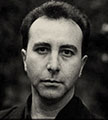White Widow a short film almost made by Angelo Salamanca |
 |
In 1995 ‘Abracadabra Films’ (now, ‘Fair Trade Films’) comprising producers, Luigi
Acquisto and Stella Zammataro, took an option on my 15
minute short screenplay White Widow which I was attached to as director and co-writer (with Lella Cariddi). I had
graduated from Swinburne Film and Television a few years beforehand and was
seeking to make my first fully-funded film.
Set
in Melbourne in 1968, White Widow is
the story of LUCIA, a southern Italian “housewife” who finds herself in a
loveless and oppressive relationship with her husband NINO, a man she married by proxy – a custom once common in amongst
Italians and Italo-Australians.
Lucia has come to realise that she
merely “married a photograph” and now, finding herself in an intolerable
situation, takes drastic action.
Lucia
forms a pact with her dear and closest friend, JOSIE, to keep Lucia’s imminent
return to Italy secret from Nino and for Josie to be entrusted indefinitely with
caring for Lucia’s beloved children, TINA and PAOLO.
I,
Lella, Luigi and Stella, were drawn to this story of a migrant family in
turmoil – a scenario which hadn’t been tackled much in Australian cinema at
that time. I was keen to depict a milieu which showed the downside to proxy
marriages and how destructive they could be in some cases. For me, this was
gut-wrenching family drama and something that I’ve always been drawn to as a
film enthusiast and film maker.
Moreover,
the narrative dealt with the relationship between two Italian women who form a
pact in order that one of them may live a fulfilling life – something that had
not been seen in Australian cinema.
The
script was worked on intensively – with the assistance of script consultant,
Annette Blonski – over a period of approximately
twelve months. During this development stage, we were able to garner written
expressions of interest from an excellent prospective cast including: Anna Maria Monticelli, Joseph Spano, and Tara Morice.
An
application was made to Film Victoria’s 1996 Independent Filmmakers Fund and to
the team’s delight, we were short-listed; some weeks later, Luigi Acquisto and
I were interviewed by a panel of three assessors.
Alas,
we missed out on funding; at the time, it wasn’t Film Victoria’s policy for assessors
on this fund to offer feedback as to why the application failed. As a team, we
could only guess at the reason why. One possible explanation could have to do
that it was a period piece set in the 1960s and as such, the budget that was submitted
may not have appeared large enough to accommodate expensive art direction /
production design. Of course, we will never know, and back then we didn’t think
it politic to approach the assessors and ask them personally.
As
a team, we were naturally extremely disappointed. Full-production funding would
have afforded us the means to produce this short period piece with the
production values it deserved. Moreover, it would have stood us in good stead
to develop and collectively produce something more substantial as a first
feature film, further down the track.
|
Published March 27, 2018. © Angelo Salamanca, March 2018
|